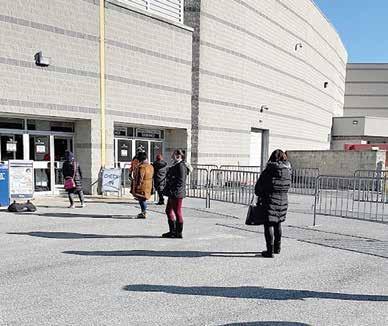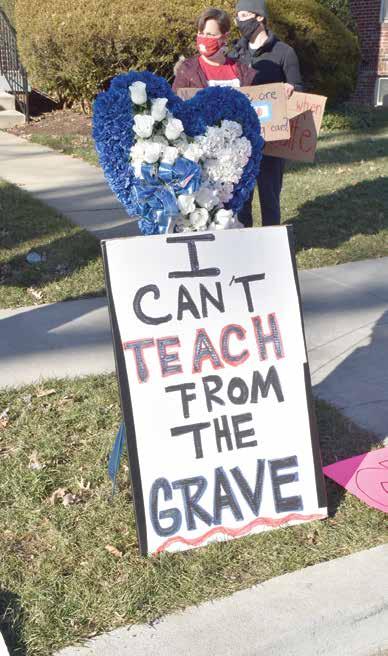
14 minute read
OpEd
EDITORIAL
Hidden Figures in Plain Sight
It’s February - Black History Month – the month of the year when this nation pauses to take note of the past achievements and contributions to society made by African Americans. It took the vision and tenacity of Dr. Carter G. Woodson, a Black man, born the son of former slaves in 1875, and who later became a Harvard University scholar, to establish a Black History Week. He observed that African Americans’ contributions “were overlooked, ignored, and even suppressed by the writers of history textbooks and the teachers who use them, to the effect that the Negro has never contributed anything to the progress of mankind.”
Woodson denounced this historical flaw and gave birth to an occasion to set the record books straight about African American achievements past and present. But the dilemma still exists. Ignorance and lack of interest in Black people and the value they give to our society are pervasive. Black history is still absent from school curriculums. Very few teachers can teach Black children – or any children – Black history or the contributions of Black people.
It took a Hollywood producer filmmaker to unveil the story of a team of Black women who worked at NASA and the critical contributions they made to the NASA’s Manned Space Program. And, these women were still present among us, living history but hidden in plain view. The contribution of a Black woman, Dr. Kizzmekia Corbett, a leading scientist involved in developing the COVID-19 vaccine that may contribute to the end of a world pandemic, remains a little-known Black History fact. And, retired Gen. Lloyd J. Austin, III, the first Black vice chief of staff of the U.S. Army and the first Black commander of U.S. Central Command, who was recently confirmed as the first Black U.S. Secretary of the Department of Defense, is not considered worthy deserving of recognition by some Black Americans. They ask, “What has he achieved worth recognizing?” We need Black History Month, and the nation owes It took the vision Dr. Woodson an expression of gratitude for making sure the contributions of Black and tenacity of Dr. people are not ignored or forgotten. But the work of remembering belongs to those among us who should not Carter G. Woodson, take these contributions for granted. There are heroes and sheroes among us, living in a Black man, born our home or our next-door neighbor. They are hidden figures in plain view, whose the son of former contributions are worth celebrating while still with us, in February and all year long. slaves in 1875, and

The Natural State of Things
I loved the story "Equestrian Program Helps Young People Battle Depression During Pandemic" by Sam P.K. Collins. I've always been an advocate of the healing powers of the outdoors from yoga, hiking, swimming, bike riding and everything else in between. I'm glad that children are able to get out and be in nature to get through this trying time.
Marlana Lamberg Washington, D.C.
TO THE EDITOR
Both Sides of the Aisle
The Black Republicans story really opened my eyes to a lot of things involving identity politics. I think that Black people should be Republicans if they so choose. I don’t understand why they get so much flack when both parties are questionable if you ask me. Maybe if there are more Black Republicans, Black people could really gain some political leverage. Just a thought.
Stephen Kirkland Hyattsville, Md.
Readers' Mailbox The Washington Informer welcomes letters to the editor about articles we publish or issues affecting the community. Write to: lsaxton@washingtoninformer. com or send to: 3117 Martin Luther King Jr Ave., SE, Washington, D.C. 20032. Please note that we are unable to publish letters that do not include a full name, address and phone number. We look forward to hearing from you.
Guest Columnist
Julianne Malveaux
Back to Normal? What's Normal?
I got my first COVID-19 vaccination last week. No big deal, an achy arm, but otherwise, just like a flu shot. The young lady who administered the shot smiled and said, “after you get your second shot, you can get back to normal." I wanted to ask her what was normal, but the man in line behind me seemed impatient, so I smiled and made my way out of the store. I thought about it all the way home, though. What's normal? I don't think crowding 30 or 40 young people into a classroom is normal. I don't believe that food lines snaking for blocks is normal. I don't think that high Black unemployment rates are normal. I don't think the wealth gap is normal.
I don't think that more than 400,000 people dead is normal. The inability to formally mourn our departed loved ones isn't normal. Crazy white people storming the Capitol surely isn't normal. And conspiracy theorist Marjorie Taylor Greene is so far away from normal that she is on the insanity spectrum.
In the ten months since the pandemic hit, we have seen changes in our communications, our employment, our economy, and more. Many of us, reasonably, yearn for the "normal" days when we could sit at a restaurant and have a meal, go to a play or a concert, invite a bunch of folks over to gather. But we should ask ourselves what was normal about our normal. In other words, were we so comfortable in our world that we didn't look outside our world? We can't miss the food lines now, but there were food lines, too, a year ago. We are focused on disparities now, but those disparities aren't new. Does back to normal mean accepting the inequities and absurdities of life as it was?
Somebody tweeted that "Rona was a disruption, and she is an opportunity." I embrace that sentiment (though I had to do a double-take at "Rona" and pray that nobody chooses to name their child after this virus). This virus is an opportunity for us to scrutinize what we consider normal and how we need to change it.
Let's start with education and the achievement gap. Students who come from low-income families don't have the same academic support that others do. They often don't have the technology to do virtual learning or the support to work through their assignments. Too often, their parents are essential workers — nurses, bus drivers, grocery store workers. Do we ever take a look at the people who serve us and notice that they are disproportionately Black and brown? When we see them do we wonder about their facts of life, about their challenges, or do we know
Guest Columnist
Benjamin F. Chavis Jr.
Time is Now for NFL to Diversify Team Ownership
As we approach the 55th Super Bowl next Sunday in Tampa, Florida, amid the continued national spread of COVID-19, I believe that the time has come for the close-knit group of team owners in the NFL to take the necessary steps to open the door to African American business leaders who hope to join that exclusive club of owners.
Given the large number of outstanding African American players today on NFL teams and the growing racial and ethnic diversity of NFL fans and supporters in all the cities where NFL teams are located, the ownership of NFL teams should begin to become as diverse as its fan and support base. Today, nearly 70% of NFL players are African American but there are no African American NFL owners. I see this as an opportunity for the leadership and owners of the NFL.
I speak not only as a fan of professional football but also as someone who has a direct interest in helping the NFL fulfill its laudable and historic commitment to building a diverse and equitable league for players, coaches, owners and the thousands of others who make professional football one of the most popular sports in the world.
Indeed, the NFL recently became a trusted partner and sponsor of the National Newspaper Publishers Association (NNPA), which represents 230 African American-owned newspapers that deliver news to our communities across various platforms, including print, digital and social media formats.
Our member publications cover the news, sports, entertainment, and culture pertaining to our excellence of performance in all aspects of human endeavor in the United States and throughout the
Guest Columnist
A Reality Check
As we enter Black History Month 2021, it's time to call out those who consider themselves Malcolmites and those who consider themselves Martinites who have too often talked the talk but not walked the walk when honoring the legacies of the two great warriors in the war against white supremacy.
Fifty-six years after the assassination of Brother Malcolm and 53 years after the assassination of Brother Martin, we have done little, if anything, to follow their guidance about the crucial need for Black unity. In a 1963 letter to eight civil rights leaders, including Brother Martin, Brother Malcolm wrote the following: "A united front involving all Negro factions, elements and their leaders is absolutely necessary. … If capitalistic Kennedy and communistic Khrushchev can find something in common on which to form a united front despite their tremendous ideological differences, it is a disgrace for Negro leaders not to be able to submerge our ‘minor' differences in order to seek a common solution to a common problem posed by a Common Enemy (emphasis his). On Saturday, August 10th from 1-7 p.m., the Muslims are sponsoring another giant outdoor rally at 116th Street and Lenox Avenue. There will be no debating, arguing criticizing or condemning. … This rally is designed not only to reflect the spirit of unity but it also gives you a chance to present your views to the largest and most explosive elements in metropolitan New York." Brother Martin was equally forceful about the need for Black unity. This is clear in the following excerpt from his 1967 book "Where Do We Go From Here: Chaos or Community?": "Too many Negro organizations are warring against each other with a claim to absolute truth....This plea for unity is not a call for uniformity. There must always be healthy debate. There will be inevitable differences of opinion....This form of group unity can do definitely
A. Peter Bailey
MALVEAUX Page 53
world. And the NFL's sponsorship will help enable our media properties to continue serving our communities at a tumultuous and confusing time when there is a great need for honest and accurate reporting.
For that support, we at NNPA are profoundly grateful.a
But there is more that could be done to advance the cause of social justice, particularly on the ques-
CHAVIS Page 53
BAILEY Page 53
Guest Columnist
Let's Dance
The hallmark of mother wit or many of the "old folk's sayings" is simplicity. "The elders" had the talent of using the simplest statements to express depth and importance in their communication. I can't recall the number of times I've heard "don't let a hard head make a soft behind," or "what happens in the dark always come to light." Easily blown off as insignificant, these sayings were usually valuable as cautionary admonitions.
I often weigh situations against the catalog of the old folk's sayings I have accumulated during my lifetime. I use this practice as I assess the possibilities of the Biden-Harris administration. Contrary to some assumptions, I don't give carte blanche acceptance to political entities, even those with whom I agree. Instead, I hold them more accountable for competent and responsible conduct.
I have had few reservations with President Biden's Cabinet choices or his numerous executive actions. Not surprisingly, I'm pleased that his initial actions hold true, or attempt to hold true, to campaign promises. My greater concern is the unlikely, but possible, onset of forgetfulness. To that possibility, I echo the admonitions of The Elders saying, "Don't forget to dance with the one who brung you!"
It is true that in the past, Black people have given our full support to politicians who forget the importance of our votes. There are innumerable candidates who, during campaigns, have fought for pulpit space in Black churches on Sundays, but, after successful elections, pretend unfamiliarity with our interests or issues.
The Biden-Harris administration has identified "four converging crises — economic crisis, climate change, racial inequity, and COVID-19." Not only is there convergence in these crises, there're also significant overlaps. President Biden has promised swift action to combat these challenges. In doing so, he MUST NOT forget his promised support to the Black community.
My readers understand the economic disparities/hardships in communities of color. According to Forbes Magazine, in May 2020 the jobless rate for Blacks was 16.8% while for whites 12.4%. The median worth of Black households in 2016 was $17,150 while for white households was $171,000. Other statistics are reported, but the bottom line for Blacks is there are barriers that deny the accumulation of wealth. President Biden acknowledges these barriers and has pledged to address them.
He also acknowledges the critical impact of climate change and pledges direct and immediate action. Hurricane Katrina is an example of a dramatic environmental disaster affecting a centralized community
E. Faye Williams
Guest Columnist
Ben Jealous
'There's a Lot Left to Be Done'
February is Black History Month — and Black people just made a whole lot of history.
Joe Biden is our president and Donald Trump is not because Black organizers and voters decided that they would not be denied their right as American citizens to be heard at the ballot box.
Kamala Harris is our history-making vice president, a Black and Southeast Asian woman and the daughter of immigrants, thanks to the millions of Black people who encouraged family, friends and neighbors to vote.
Rev. Raphael Warnock and Jon Ossoff are senators because Black people and their allies in Georgia turned out in November, and again in January, to signal a new day in the heart of the Old South.
All this makes me grateful that Black History Month comes in February. It encourages us to think about those who made these historic moments possible.
I'm thinking about the freedom fighters and voting rights activists — and the courageous ordinary people whose names don't show up in history books, but who showed up to fight against injustice. They often faced violence and brutality that was fueled by the racist power structure's desire to maintain power at all costs.
Does that sound familiar? Just a few weeks ago, we saw our democracy challenged by that same kind of poison. We watched a president
Askia-At-Large
Askia Muhammad
Liberal Hypocrisy Fuels Trumpism
Funny thing about neoliberal orthodoxy in 21st-century American politics, its white-biased fecklessness has permitted an armed mob to infiltrate every rung of political power in this country and threaten the very fiber of the U.S. government, while it bludgeons innocent Black victims into corners of shame.
The inveterate liar who is this country's Twice Impeached Private Citizen (TWIMPRIC) now living in Florida is the leader of a frenzied and growing throng, whose sheer rumored presence has turned Washington, D.C., into a ghostly slum. The U.S. Capitol is a fortress surrounded by nine-foothigh fences topped with razor wire. D.C.'s fancy downtown banks and law offices are now trampy facades covered with cheesy plywood. And 16th Street, the 77th global Prime pack of Confederacy-loving senators and congress members who call themselves the Freedom Caucus, and who also carry arms on their person, literally in the halls of Congress. Just who do they think they are "protecting" themselves from on the House or Senate floor? These scoundrels berate and harass their fellow Congress members, and threaten to physically fight them without fear of any consequences. One such gun-toting member —freshman Marjorie Taylor Greene (R-Ga.) — "liked" a comment on her Facebook page which said that the quickest way to get rid of House Speaker Nancy Pelosi was with a "bullet in her head." No consequences! No consequences!
The wicked, armed right-wing bullies and would-be assassins are not only anti-Black to the Nth Degree, they are virulently anti-Semitic. Greene for exam-
Meridian, with its "Black Lives Matter Plaza," approaching the now fortified White House presidential "mansion," has become a grimy back alley.
These lawless — the Oath Keepers, 3 Percenters, Proud Boys and Boogaloo Boys — are able to reign supreme on the streets of Washington because they openly boast of being armed. The established law enforcement agencies can't (or won't) control them. And they are defended by an equally treasonous incite his supporters to violence by denying the legitimacy of Black people's votes. The rage among Trump's followers was stoked by endless repetitions of the lie that so-called real Americans had reelected him in a landslide, and that the election was stolen from them by corrupt big-city machines — read Black officials and voters — and their communist allies.
Black History Month is a good time to remember that Martin Luther King Jr. and the movement he led were also smeared as communists out to destroy America.
And you don't have to be a historian to have noticed the Confederate flags and the lynching noose brought to the Capitol on Jan. 6 by the mob that claimed they were taking back the election and the country.
In 2013, conservatives on the U.S. Supreme Court gutted the Voting Rights Act, which has long been considered the crown jewel of the civil rights movement.
WILLIAMS Page 54
JEALOUS Page 54
ASKIA Page 54





